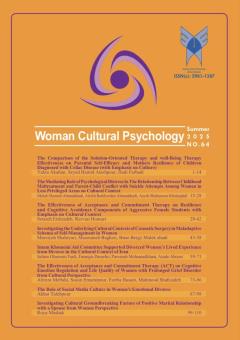The Effectiveness of Acceptance and Commitment Therapy on Resilience and Cognitive Avoidance Components of Aggressive Female Students with Emphasis on Cultural Context
Subject Areas : Psychology
Setareh Eidizadeh
1
![]() ,
Rezvan Homaei
2
*
,
Rezvan Homaei
2
*
![]()
1 - Graduated in Clinical Psychology, Department of Psychology, Faculty of Islamic Education, Ahv.C., Islamic Azad University, Ahvaz, Iran
2 - Assistant Professor, Department of Psychology, Faculty of Islamic Education,, Ahv.C., Islamic Azad University, Ahvaz, Iran
Keywords: Acceptance and commitment therapy, Resilience, Cognitive avoidance,
Abstract :
The aim of the present study was to determine the effectiveness of acceptance and commitment therapy on resilience and cognitive avoidance components of aggressive female students with an emphasis on the cultural context. The statistical population of the study was all ninth grade female students in Ahvaz in 2024. The sample of the study was 30 individuals from the aforementioned population who were selected through purposive sampling procedure and randomly assigned to an experimental group (15 participants) and control group (15 participants). The research method was a semi-experimental pre-test-post-test type with control group and follow-up. The research instruments included Sexton and Dugas's Cognitive Avoidance Questionnaire (2008) and Connor and Davidson's Resilience Questionnaire (2003). The experimental group was exposed to 8 sessions of acceptance and commitment therapy, 90 minutes each for twice a week. After two months later the follow-up was processed. In order to analyze the data, repeated measures analysis of variance test was used. The results of the study showed that acceptance and commitment therapy significantly reduced cognitive avoidance and increased resilience in the experimental group. It should be concluded that by applying acceptance and commitment therapy and adapting it to specific cultural needs and characteristics, the psychological and social status of aggressive female students could be improved.
Akbari, M., Seydavi, M., Davis, C. H., Levin, M. E., Twohig, M. P., & Zamani, E. (2022). The current status of acceptance and commitment therapy (ACT) in Iran. Iranian Journal of Contextual Behavioral Science, 26, 85-96. [Persian] DOI:10.1016/j.jcbs.2022.08.007
Amel, H.R., & Fouladi, A. (2023). The effectiveness of acceptance and commitment therapy on adolescent aggression in welfare family-like centers. Iranian 7th International Conference on Interdisciplinary Studies in Psychology, Counseling, Education and Educational Sciences, Tehran. [Persian] URL: https://civilica.com/doc/1993425
Basaknejad, S., Moeini, N., & Mehrabizadeh Honarmand, M. (2010). The relationship between post-event processing and cognitive avoidance with social anxiety in students. Iranian Journal of Behavioral Sciences, 4(4), 335-340. [Persian] URL: https://sid.ir/paper/129700/fa
Connor, K. M., & Davidson, J. R. (2003). Development of a new resilience scale: The Connor-Davidson Resilience Scale (CD-RISC). De press Anxiety. American Journal of Orthopsychiatry, 18, 76-82. URL: https://doi.org/10.1037/0002-8232.66.4.824
Dryman, M. T., Gardner, S., Weeks, J. W., & Heimberg, R. G. (2016). Social anxiety disorder and quality of life: How fears of negative and positive evaluation relate to specific domains of life satisfaction. Asian Journal of Anxiety Disord, 38, 1-8. DOI: 10.1016/j.janxdis.2015.12.003
Eifert, A. S., & Forsiyat, F. W. (2005). Acceptance and Commitment Therapy: Model, Processed and Outcomes.Asian Journal of Behavior Research and Therapy, 15(44), 1-25. URL:https://civilica.com/doc/785525.
Floyd, M., Garfield, A., & LaSota, M. T. (2005). Anxiety sensitivity and worry. American Journal of Personality and Individual Differences, 38(5), 1223-1229. URL: https://doi.org/10.1016/j.paid.2004.08.005
Fulmer, R., Joerin, A., Gentile, B., Lakerink, L., & Rauws, M. (2020). Cultural adaptation of psychological interventions: A review of the literature. Asian Journal of Cross-Cultural Psychology, 51(4), 531-542. URL: https://journals.sagepub.com/doi/10.1177/0022022120919177.
Hayes, S. C. (2004). Acceptance and commitment therapy, relational frame theory, and the third wave of behavioral and cognitive therapies.American Journal of Orthopsychiatry Behavior Therapy, 35(4), 639-65. URL: https://doi.org/10.1016/S0005-7894(04)80013-3
Hayes, S. C., Strosahl, K. D., & Wilson, K. G. (2016). Acceptance and Commitment Therapy: The Process and Practice of Mindful Change. American Journal of Guilford Press. URL: https://www.guilford.com.
Hayes, S., & Gifford, E. (1997). Experiential avoidance rules, and the nature of verbal events. American Journal of Psychological Society, 8(3), 170-173. URL: https://doi.org/10.1111/j.1467-9280.1997.tb00405.x
Hofmann, S. G., Asnaani, A., Vonk, I. J. J., Sawyer, A. T., & Fang, A. (2019). The efficacy of cognitive behavioral therapy: A review of meta-analyses. American Journal of Cognitive Therapy and Research, 43(4), 541-555. URL: https://link.springer.com/article/10.1007/s10608-019-10006-1.
Jin, Q., Ma, W., Zhang, Y., Wang, H., Hao, J., Geng, Y., ... & Lu, S. (2022). Risk factors associated with increased anxiety sensitivity in children and adolescents in Northwest China during COVID-19 pandemic lockdown. Frontiers in Psychology, 13, 933207. DOI: 10.3389/fpsyg.2022.933207
Kashdan, T. B. 1., Barrios, V., Forsyth, J. P., & Steger, M. F. (2006). Experiential avoidance as a generalized psychological vulnerability: comparisons with coping and emotion regulation strategies. George Mason University. American Journal of Department of Psychology, 44(9), 1301-20. DOI: 10.1016/j.brat.2005.10.003
Lerche, S., Gutfreund, A., Brockmann, K., Hobert, M. A., Wurster, I., Sunkel, U., & Berg.,D. (2018). Effect of physical activity on cognitive flexibility, depression and RBD in healthy elderly. American Journal of Clin Neurol Neurosurg; 165, 88-93. DOI: 10.1016/j.clineuro.2018.01.008
Mitchell, A. J., Benito-León, J., González, J. M., & Rivera-Navarro, J. (2005). Quality of life and its assessment in multiple sclerosis: integrating physical and psychological components of wellbeing. American Journal of The Lancet Neurology, 4(9), 556-566. DOI: 10.1016/S1474-4422(05)70166-6
Mohammadi, M. (2006). Investigating resilience factors in individuals at risk of drug abuse. Iranian Journal of Modern Psychological Research (Psychology, University of Tabriz), 1(3-2), 203-224. [Persian] URL: https://sid.ir/paper/120410/fa
Sexton, K. A., & Dugas, M. J. (2008). The cognitive avoidance questionnaire: Validation of the English translation. American Journal of Anxiety Disorder, 22(3), 335-370. DOI: 10.1016/j.janxdis.2007.04.005
Shakerinia, I,. & Mohammadpourshatri, M. (2010). The relationship between job stress and resilience with burnout in female nurses. Iranian Journal of Kermanshah University of Medical Sciences (Behbood), 14(2 (46th issue), 161-169. [Persian] URL: https://sid.ir/paper/448833/fa
Zhou, X., & Wu, X. (2020). Posttraumatic stress disorder and aggressive behavior in adolescents: A longitudinal and interpersonal functional approach. Children and youth services review, 114, 105027. DOI: 10.1016/j.childyouth.2020.105027

